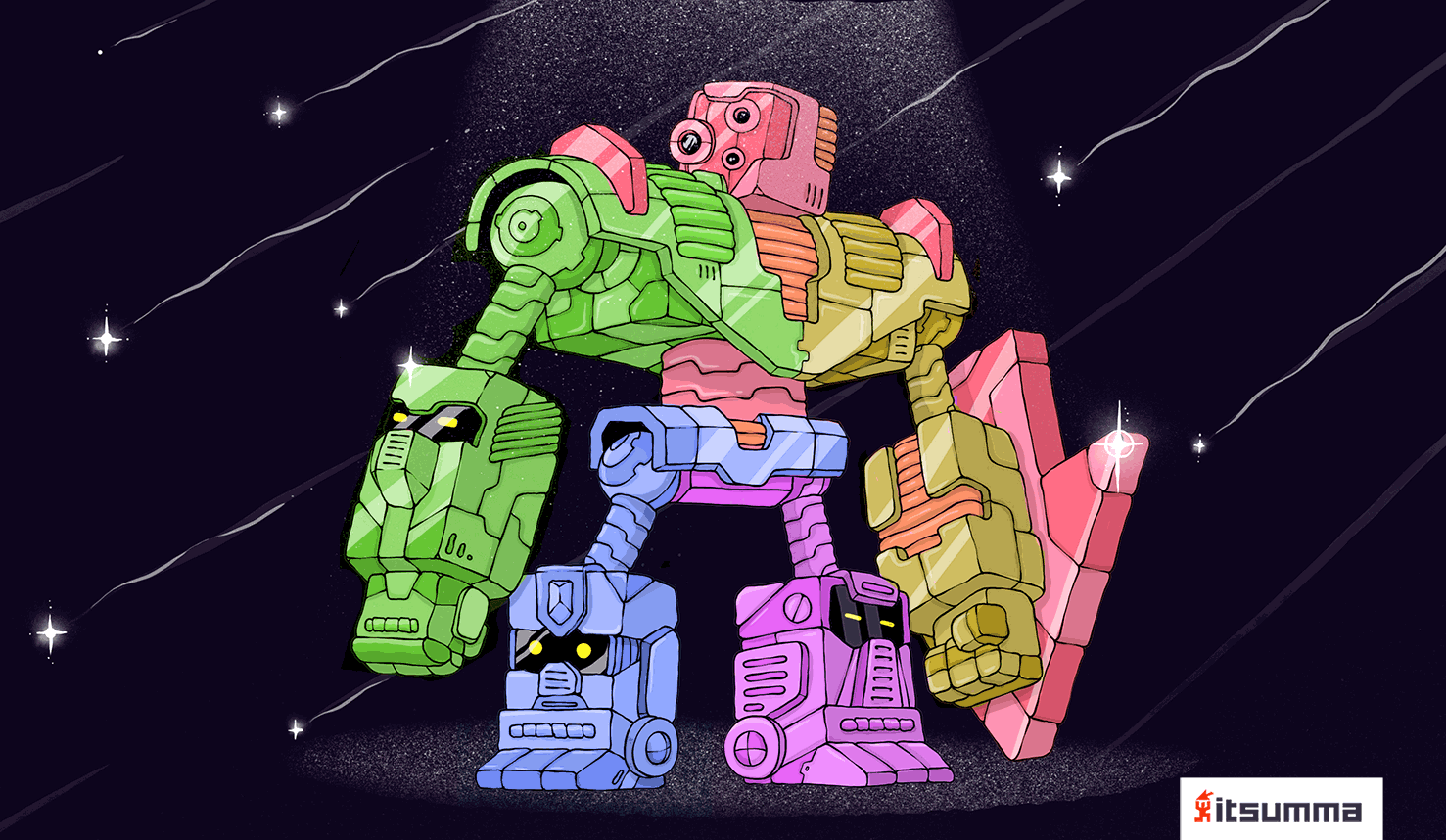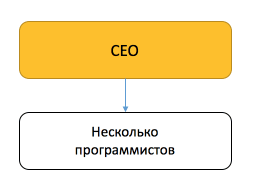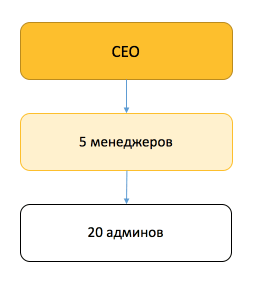Director of common sense: how to stop everything in control and start working in a team
This article is a free retelling of my report on the past Highload.
I head a company in which 75 people work, and we started five years ago five of us.
And I would like to tell how, over time, and why the management system changed, what major mistakes we made, how we corrected them, and what we learned about it.

First stage: 2008, 5 people
At first everything was simple: the director, he is the manager for all issues, and several executors - programmers who simultaneously performed the admin tasks.

Good
In this period, in fact, a lot of good - everything is simple, clear and fast. Large tasks are easily divided into smaller specific tasks for performers. There is an idea about each performer: it is clear which task will be better coped with, and there is enough time to discuss the problem with each if difficulties arise.
Performers perform, in fact, direct instructions; the work is done and the whole scheme can be kept in mind
At some point there were so many performers that it was impossible to cope with them alone. It became clear that another manager was needed.

poorly
This is where the problems started. As it turned out, the problems are not at all unique, everyone writes and speaks about it, but this does not help much.
The main problem: where to get the manager? At first I tried to take the best performer and upgrade it to the manager. It seems that if a person performs tasks well - it works - then he can be a good manager, this is also a job, but he works well. The only problem is that this is another job.
At the same time, when I appointed a person as a manager who was not going to be a manager, I didn’t even think that I needed to explain to him what his new job was. After all, everyone understands what a manager is, what his tasks, tools, powers are. I was very wrong.
But not only is it incomprehensible to the manager himself, it is also incomprehensible to the performers. In addition, the new manager - he's a programmer. Technical guys are not always social, it’s probably easier to work with computers, and here, it turns out, you need to communicate with people. And not just to communicate, but to speak from the position of the head: to argue, and convince, to seek compromises.
This is a strong stress - completely different tasks, other problems. Subordinates may not want to work, he does not know how to manage them, does not understand what they want from him and what he can do.
And very soon the new manager has an obvious solution. It is necessary to return to the usual mode: after all, he himself is a good performer - why go, persuade someone, monitor performance. Hurry up and do everything yourself.
As a result, the person simply collapses with tasks that he tries to do himself, and from the outside everything looks fine, tasks are being carried out, work is on. But in fact, the person is in the most severe stress, barely copes with the load, works a lot, does everything himself. And his subordinates, too, do not complain - only simple tasks or tasks that have no hard deadline reach them. Nobody crushes, you can work quietly.
When there are really a lot of tasks, big problems begin, because the new executive manager has not learned how to transfer tasks below, cannot talk to people, and he himself cannot physically do everything himself. I want to put pressure on the manager so that he stops doing the work that he has to delegate. The manager suffers from this even more, nothing can still be done, and this does not help the cause.
At the same time, the problem was higher. If earlier I myself distributed tasks to programmers, then now there is some kind of manager who makes it worse than me. I see that he does not cope, and I climb myself, I manage his every movement, in the hope that in this way he will learn to do it right. But man does not study like that. On the contrary, it leaves any attempts to learn. At some point, he stops even to resist and decides - he still will not be given to think for himself, it means his task is simply to carefully translate everything that his boss tells him to a level below.
How did
Search and training new managers
Now I know that if I appoint someone as a manager, then I must formulate his duties, explain what he can, what he should do, what is expected of him, what powers he has for it. And not only him, but his subordinates.
We have been looking for new managers within the team this way: from time to time we give executives managerial tasks. Either we ourselves propose a change of management, because we think that he will succeed well, or if the person himself wants to try.
The main thing here is to understand not only whether a person can be a manager, but whether he is interested or not. If he can, but he is not interested, then we do not insist.
If it can and is interesting, then attach it to another manager who already works well, and they work together. When a new manager gains enough experience, he begins to work independently.
I am still skeptical about hiring managers from the outside, all our managers have grown within the company.
Second stage: 2014, 30 people
We gradually grew and came to this configuration: a director, five managers and a cloud of performers. That is, the performers are not divided into separate teams, managers choose any free people for their projects.

Good
From a business point of view, everything is very healthy. Everything we aspired for was working out. We grew up, new customers appeared, they became more and more, they began to learn about us.
poorly
But inside, in fact, everything was not so good.
The main problem at this stage - managers suddenly had high-level tasks. Previously, a clear task came from me: “Collect, please, a server, put such an OS on it, a patch of such and such, SQL of such and such version, PHP of such and such version”. But the number of tasks has grown dramatically, I myself have ceased to cope with the processing of the flow, and the managers of the tasks from concrete suddenly began to look something like this: "Collect, please, the server is good and correct." It was expected that the manager would be able to parse this high-level task, delegate to the people who are suitable for this, and monitor its implementation. But I tried too hard to control everything, so the managers did not have the habit of making decisions on their own. We had to urgently do something about it.
We continued to hope that we could scale horizontally: as the number of tasks grows, we will be able to take more and more performers and we will be able to cope without changing the structure. Will nine women give birth to one child in one month?
However, we did not understand how to hire people. Either there were not enough people, or several newly hired employees appeared at once, with whom it was not clear what to do: there is no certainty that they may not work at all, but to bring them up to date and check how they work, you have to spend quite a lot time that is not there anyway. Therefore, we’ll better work out and do everything with the old team, rather than spending time on explanations. And again overload, mess.
How did
Control
Sometimes you want to completely control everything, sometimes you want to give a task and say: "Understand yourself, do not want to know anything, should be done." But we must look for the middle. It is better to give managers to cope with tasks themselves, try not to interfere, but still watch what is happening. It seems that if you do not control it, then everything will go wrong, but there are deadlines, obligations. But, if you continue to strictly control everything, everything will still go wrong: a person will not learn to be a manager, because he is not allowed to be a manager. And after a certain amount of tasks, the attention of the head is still not enough, and it turns out that the manager did not appear.
It is very important that a person understands how you evaluate his work. Did he do the right thing and what can be done better. It is necessary and praise and scold. If you scold, then so that it was clear how to do better. So a person has a clear coordinate system, and he understands what is wanted of him and why.
High level tasks
To solve the problem with high-level tasks, another level of management was organized - the Timlides. Timlid is such a brigadier, he works as a performer, but at the same time he can organize other employees at his level, he is more experienced than others and can explain how and how to do better and specify tasks. With the help of teamlids, it was possible to remove part of the load from managers for parsing high-level tasks for specific tasks.
Hiring new artists
We began to prepare in advance a pool of candidates so that at the right time it was possible to hire the necessary number of people and at the same time have time to bring them up to date.
Third Stage: 2016, 65 people
Good and bad
The rapid growth of business leads to the fact that new directions are being created within the company, which are transformed into autonomous business units. For example, our development department is an autonomous unit that lives on its own - not just a department with managers, but rather a company within a company.

Under these conditions, it is necessary to delegate not just high-level tasks, but tasks related to business that are associated with the risk of entrepreneurship.
For example, you need to invent and make a new product: how it will technically work, how it will be sold, think over marketing. But hired employees are not used to receiving business tasks. There are entrepreneurs, and there are employees. Usually they are completely different people.
At the same time, it would be desirable to control everything even more, because the stakes are rising - decisions of this level are directly related to money, scary.
As I wrote above, it is impossible to strictly control, otherwise there will be no management at the next levels; everyone will follow direct instructions and no one will think for himself and offer solutions.
Communication congestion: each of my managers needs time to discuss at least the main issues. And when I had, say, four communication channels, then everyone got a quarter of my time. But such channels are no longer four, but 20, and this is even worse than just 1/20 of the time per person. Because for the time that has passed since our last conversation, everything could have changed. And I also cannot shorten the time between conversations, because the others are also waiting. And all this is multiplied, and diverges in all levels of management.
How to cope
Another level of management has appeared - department heads, one of them has a “common sense director” seriously written in his work room and this is no accident. We discuss all the issues with them, and they, in turn, pass everything on to their managers. However, they have the right to disagree with me, or independently reformulate the task, sometimes even without my participation. Or even say: “Zhen, you are talking nonsense, let’s think about another day and then discuss it again.”
When a company grows to 50-70 people, because of problems with communication, managers no longer know what is happening with the company where it is going, what plans the management has, so that this does not happen, we have several special chats for all management levels. In which all new directions are discussed every day, and updates on current affairs are written. Thus, instead of receiving one twentieth of director time, a person receives a constant chat, and sees what happens in all departments. It is much clearer to everyone what is happening, there is a general picture of what is happening. And much less surprises, less chaos and, accordingly, less stress.
Control again
And again, you need to reduce the degree of control: there should be a new look at the company. Inevitably have to change the management structure. Previously, it was something yours, personal, than you yourself managed, taxied in the right direction. But the time has come when other people control large parts of this mechanism. We must allow people to make their own decisions, let them make mistakes and learn from mistakes. Trust people with whom you work as a team.
Conclusion
This is not the only way to develop a company, and not even the most correct one. But this is the path we have traveled, and our mistakes, my mistakes. Most likely, we are not doing everything right now. I will be glad to any comments and tips :)
')
Source: https://habr.com/ru/post/342212/
All Articles